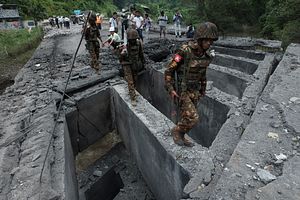Ethnic rebels in Myanmar staged coordinated attacks Thursday in five locations, including at a military academy outside normal combat areas, where a civilian was killed and a soldier wounded.
The Northern Alliance, a coalition of armed groups from the Kokang, Rakhine, and Ta-ang, or Palaung, minorities, claimed responsibility for the attacks in Mandalay region, where the Defense Services Technology Academy is located, and in Northern Shan state, where 14 people were reported killed.
The rebel alliance said they launched the attacks in self-defense because the Myanmar military didn’t stop offensive operations in areas where the minorities live.
The rebels are active in northern Myanmar, including Northern Shan state’s Naung Cho township, where they damaged a bridge and attacked a police outpost.
A volunteer from the Saydanarmon Civil Society group in Naung Cho said they had recovered 14 bodies from Thursday’s fighting, including two civilians and members of the security forces.
A Defense Ministry statement acknowledged attacks in five places, and charged that they were carried out in retaliation for government raids on illicit drug operations. It noted the death of a civilian staff member of the military academy and the wounding of a soldier. Combat in Northern Shan state is not unusual, but attacks in Mandalay region, the country’s heartland, are virtually unprecedented.
The military’s statement also said the rebels seized six 107-mm rockets in a separate attack.
Since getting independence from Britain in 1948, Myanmar has been wracked by fighting with minority groups in border areas seeking greater autonomy from the central government. In the past three decades, the government has reached various ceasefire arrangements with many groups, but it is striving for a comprehensive, more permanent political situation. Most of the groups have so far rejected the government’s attempts at a settlement, and combat is ongoing in northern and western areas of the country.
The rebel alliance comprises the Kokang minority’s Myanmar National Democratic Alliance Army, the Ta’ang National Liberation Army, and the Arakan Army. It posted its statement on the attacks on the Russian social media site VK, where it established an account just days ago under the name “Three Brother Alliance Group.”
The Kokang minority was long associated with the production of illicit drugs, such as opium and its derivative, heroin, but claims to have left the trade. The Ta’ang group in recent years has staged a number of deadly hit-and-run raids in northern cities. The Arakan Army, which claims to act on behalf of the Buddhist Rakhine minority in the western state of Rakhine, has been carrying out large-scale stacks on government forces on its home ground since late last year.
Myanmar’s military warned in a statement Wednesday that a general ceasefire it declared last year “paving the way for the ethnic armed organizations to engage in peace talks without being forced or pressured” will expire at the end of this month. Reports from both the government and rebels suggest that the ceasefire was rarely observed.
By Pyae Sone Win for The Associated Press.

































